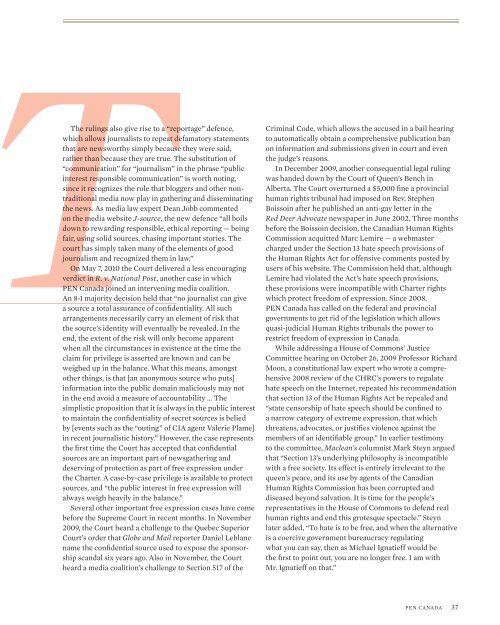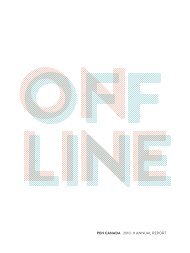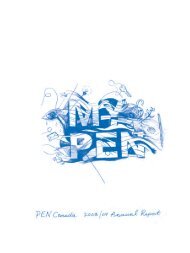writers in prison committee report - PEN Canada
writers in prison committee report - PEN Canada
writers in prison committee report - PEN Canada
You also want an ePaper? Increase the reach of your titles
YUMPU automatically turns print PDFs into web optimized ePapers that Google loves.
The rul<strong>in</strong>gs also give rise to a “<strong>report</strong>age” defence,<br />
which allows journalists to repeat defamatory statements<br />
that are newsworthy simply because they were said,<br />
rather than because they are true. The substitution of<br />
“communication” for “journalism” <strong>in</strong> the phrase “public<br />
<strong>in</strong>terest responsible communication” is worth not<strong>in</strong>g,<br />
s<strong>in</strong>ce it recognizes the role that bloggers and other nontraditional<br />
media now play <strong>in</strong> gather<strong>in</strong>g and dissem<strong>in</strong>at<strong>in</strong>g<br />
the news. As media law expert Dean Jobb commented<br />
on the media website J-source, the new defence “all boils<br />
down to reward<strong>in</strong>g responsible, ethical <strong>report</strong><strong>in</strong>g — be<strong>in</strong>g<br />
fair, us<strong>in</strong>g solid sources, chas<strong>in</strong>g important stories. The<br />
court has simply taken many of the elements of good<br />
journalism and recognized them <strong>in</strong> law.”<br />
On May 7, 2010 the Court delivered a less encourag<strong>in</strong>g<br />
verdict <strong>in</strong> r. v. national post, another case <strong>in</strong> which<br />
<strong>PEN</strong> <strong>Canada</strong> jo<strong>in</strong>ed an <strong>in</strong>terven<strong>in</strong>g media coalition.<br />
An 8-1 majority decision held that “no journalist can give<br />
a source a total assurance of confidentiality. All such<br />
arrangements necessarily carry an element of risk that<br />
the source’s identity will eventually be revealed. In the<br />
end, the extent of the risk will only become apparent<br />
when all the circumstances <strong>in</strong> existence at the time the<br />
claim for privilege is asserted are known and can be<br />
weighed up <strong>in</strong> the balance. What this means, amongst<br />
other th<strong>in</strong>gs, is that [an anonymous source who puts]<br />
<strong>in</strong>formation <strong>in</strong>to the public doma<strong>in</strong> maliciously may not<br />
<strong>in</strong> the end avoid a measure of accountability … The<br />
simplistic proposition that it is always <strong>in</strong> the public <strong>in</strong>terest<br />
to ma<strong>in</strong>ta<strong>in</strong> the confidentiality of secret sources is belied<br />
by [events such as the “out<strong>in</strong>g” of CIA agent Valerie Plame]<br />
<strong>in</strong> recent journalistic history.” However, the case represents<br />
the first time the Court has accepted that confidential<br />
sources are an important part of newsgather<strong>in</strong>g and<br />
deserv<strong>in</strong>g of protection as part of free expression under<br />
the Charter. A case-by-case privilege is available to protect<br />
sources, and “the public <strong>in</strong>terest <strong>in</strong> free expression will<br />
always weigh heavily <strong>in</strong> the balance.”<br />
Several other important free expression cases have come<br />
before the Supreme Court <strong>in</strong> recent months. In November<br />
2009, the Court heard a challenge to the Quebec Superior<br />
Court’s order that globe and mail <strong>report</strong>er Daniel Leblanc<br />
name the confidential source used to expose the sponsorship<br />
scandal six years ago. Also <strong>in</strong> November, the Court<br />
heard a media coalition’s challenge to Section 517 of the<br />
Crim<strong>in</strong>al Code, which allows the accused <strong>in</strong> a bail hear<strong>in</strong>g<br />
to automatically obta<strong>in</strong> a comprehensive publication ban<br />
on <strong>in</strong>formation and submissions given <strong>in</strong> court and even<br />
the judge’s reasons.<br />
In December 2009, another consequential legal rul<strong>in</strong>g<br />
was handed down by the Court of Queen’s Bench <strong>in</strong><br />
Alberta. The Court overturned a $5,000 f<strong>in</strong>e a prov<strong>in</strong>cial<br />
human rights tribunal had imposed on Rev. Stephen<br />
Boisso<strong>in</strong> after he published an anti-gay letter <strong>in</strong> the<br />
red deer advocate newspaper <strong>in</strong> June 2002. Three months<br />
before the Boisso<strong>in</strong> decision, the Canadian Human Rights<br />
Commission acquitted Marc Lemire — a webmaster<br />
charged under the Section 13 hate speech provisions of<br />
the Human Rights Act for offensive comments posted by<br />
users of his website. The Commission held that, although<br />
Lemire had violated the Act’s hate speech provisions,<br />
these provisions were <strong>in</strong>compatible with Charter rights<br />
which protect freedom of expression. S<strong>in</strong>ce 2008,<br />
<strong>PEN</strong> <strong>Canada</strong> has called on the federal and prov<strong>in</strong>cial<br />
governments to get rid of the legislation which allows<br />
quasi-judicial Human Rights tribunals the power to<br />
restrict freedom of expression <strong>in</strong> <strong>Canada</strong>.<br />
While address<strong>in</strong>g a House of Commons’ Justice<br />
Committee hear<strong>in</strong>g on October 26, 2009 Professor Richard<br />
Moon, a constitutional law expert who wrote a comprehensive<br />
2008 review of the CHRC’s powers to regulate<br />
hate speech on the Internet, repeated his recommendation<br />
that section 13 of the Human Rights Act be repealed and<br />
“state censorship of hate speech should be conf<strong>in</strong>ed to<br />
a narrow category of extreme expression, that which<br />
threatens, advocates, or justifies violence aga<strong>in</strong>st the<br />
members of an identifiable group.” In earlier testimony<br />
to the <strong>committee</strong>, maclean’s columnist Mark Steyn argued<br />
that “Section 13’s underly<strong>in</strong>g philosophy is <strong>in</strong>compatible<br />
with a free society. Its effect is entirely irrelevant to the<br />
queen’s peace, and its use by agents of the Canadian<br />
Human Rights Commission has been corrupted and<br />
diseased beyond salvation. It is time for the people’s<br />
representatives <strong>in</strong> the House of Commons to defend real<br />
human rights and end this grotesque spectacle.” Steyn<br />
later added, “To hate is to be free, and when the alternative<br />
is a coercive government bureaucracy regulat<strong>in</strong>g<br />
what you can say, then as Michael Ignatieff would be<br />
the first to po<strong>in</strong>t out, you are no longer free. I am with<br />
Mr. Ignatieff on that.”<br />
<strong>PEN</strong> CANADA 37




